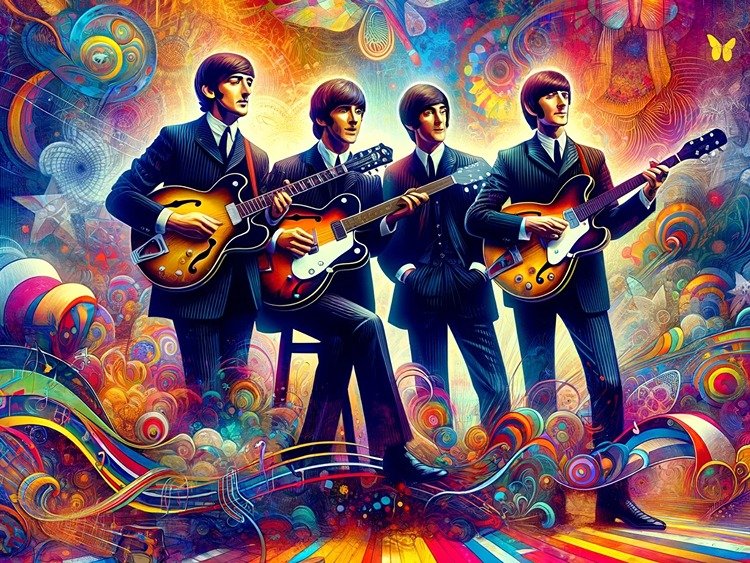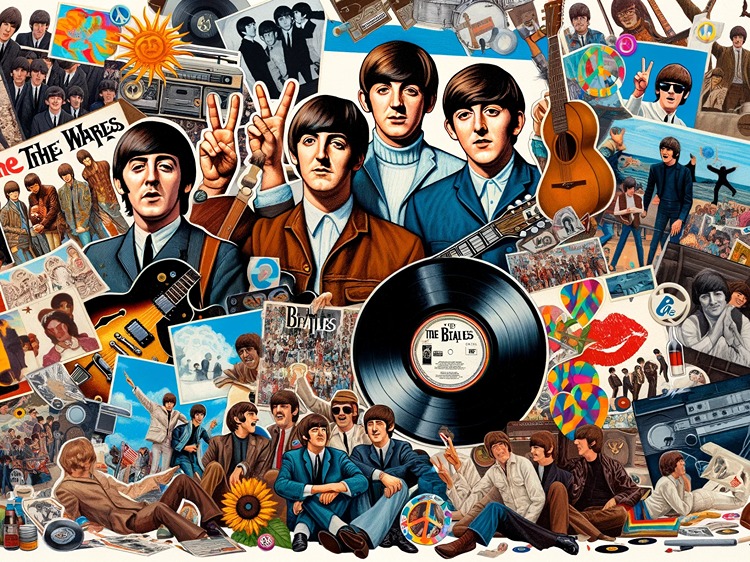The story of The Beatles isn’t just a musical journey; it’s a monumental leap into the heart of cultural transformation during the 1960s. This era, marked by intense social changes, found its soundtrack in the chords and melodies of four lads from Liverpool. John Lennon, Paul McCartney, George Harrison, and Ringo Starr didn’t just play music; they stirred emotions, challenged norms, and shaped a generation’s identity. Their story is a blend of creativity, innovation, and the relentless pursuit of something new—something that echoed the collective yearnings of a world on the brink of change.
Our dive into the Beatles’ universe isn’t just about the songs they sang or the albums they produced. It’s about understanding how and why they became the icons of change. Their influence stretched beyond music, seeping into fashion, film, and even politics. They were more than musicians; they were pioneers of a new cultural era. This article aims to explore the depth of their impact, shedding light on their musical innovations, cultural significance, and lasting legacy that continues to inspire even today.
Breaking Down Barriers: The Music That Changed Everything
The Beatles’ musical journey began in the clubs of Hamburg and the Cavern Club in Liverpool, where their unique sound—characterized by catchy melodies, harmonious vocals, and innovative music arrangements—started to capture attention. Their early hits, like “Love Me Do” and “Please Please Me,” were just the beginning. What followed was a series of groundbreaking albums that pushed the boundaries of what music could be.
Albums such as “Rubber Soul,” “Revolver,” and the iconic “Sgt. Pepper’s Lonely Hearts Club Band” showcased a bold departure from traditional pop music. These works introduced complex harmonies, innovative recording techniques, and a wide range of musical styles and instruments from around the world. The Beatles weren’t just making music; they were crafting experiences, telling stories, and opening minds to the possibilities of sound.
The Cultural Phenomenon: More Than Music

The Beatles’ impact wasn’t confined to the realms of music. They became symbols of social and cultural change, embodying the youthful rebellion and optimism of the 1960s. Their hairstyles, fashion, and public statements made headlines, challenging conventional norms and encouraging a generation to question authority and pursue freedom and peace.
Moreover, their appearances on television and in films like “A Hard Day’s Night” and “Help!” introduced new forms of entertainment that blended music, humor, and storytelling. The Beatles didn’t just adapt to the cultural shifts of the 1960s; they helped drive them, becoming voices for civil rights, anti-war movements, and the global counterculture.
Innovation in the Studio: A New Era of Music Production
The Beatles’ exploration of the recording studio as an instrument in its own right was revolutionary. Working with producer George Martin, they transformed the studio from a place of mere recording into a creative haven where sounds could be manipulated, layered, and reinvented. Techniques such as multi-tracking, tape loops, and the use of non-traditional instruments became hallmarks of their sound, influencing countless artists and producers in the decades that followed.
Tracks like “Tomorrow Never Knows” and albums like “Sgt. Pepper’s” were testaments to their studio experimentation, blending elements of rock, classical, Indian music, and avant-garde. This approach not only expanded the sonic possibilities of pop music but also elevated the album to a work of art, a cohesive collection of songs with a unified theme or concept.
Lyrics That Spoke to a Generation
The Beatles’ songwriting, particularly that of Lennon and McCartney, evolved dramatically over the years. Their early love songs gave way to more introspective, philosophical, and socially conscious lyrics. Songs like “Eleanor Rigby,” “Let It Be,” and “Revolution” reflected the complexities of life, love, and the world, resonating with the hopes, fears, and aspirations of their audience.
Their music offered solace, inspiration, and a sense of solidarity to a generation facing unprecedented social upheavals. The Beatles managed to capture the essence of the human experience in their lyrics, making their music timeless and universally relatable.
Legacy and Influence: The Beatles’ Enduring Impact
The Beatles disbanded in 1970, but their influence is far from over. They left behind a legacy that continues to inspire musicians, artists, and cultural movements around the world. Their innovative approach to music and their ability to capture the spirit of their times make them not just a band of the past, but a continual source of inspiration for the future.
Their contribution to music and culture is celebrated in museums, academic studies, and tributes across the globe. The Beatles changed the landscape of popular music, setting new standards for artistic creativity and commercial success. Their impact extends beyond music, influencing fashion, film, and societal values, making them one of the most significant cultural figures of the 20th century.
FAQs
- How did The Beatles change music? The Beatles revolutionized music through their innovative songwriting, recording techniques, and blending of various musical styles. They expanded the boundaries of pop music, introducing complex harmonies, experimental sounds, and concept albums.
- What made The Beatles so influential in the 1960s? Beyond their musical innovations, The Beatles embodied the spirit of the 1960s, challenging societal norms, promoting peace and love, and participating in the cultural and social revolutions of the time. Their global popularity also made them a powerful force for cultural exchange.
- Are The Beatles still relevant today? Yes, The Beatles’ music and influence remain highly relevant. Their songs continue to be celebrated, covered, and studied, and their approach to music production and cultural engagement continues to inspire new generations of artists and musicians.
Bottom Line
The Beatles were not just a band; they were a phenomenon that transcended music, influencing cultural, social, and political spheres. Their journey from Liverpool to global superstardom is a testament to their incredible talent, creativity, and vision. The Beatles revolutionized music and culture in the 1960s, leaving a legacy that continues to inspire and resonate across the world. Their story is a vivid reminder of music’s power to reflect and shape the world around us, making them enduring icons of change and innovation.
In exploring the vast ocean that is The Beatles’ influence, it’s clear they were more than musicians; they were architects of a new cultural landscape. Their legacy is not just in the notes they played or the words they sang, but in the endless waves of change they set in motion, forever altering the course of music and culture.

